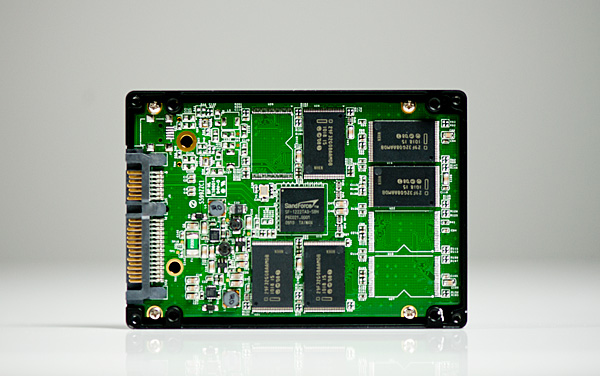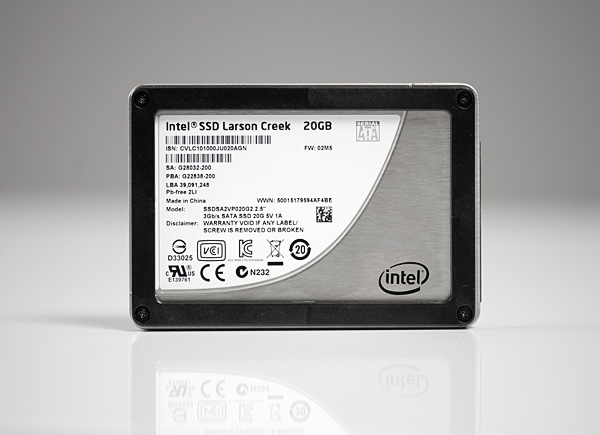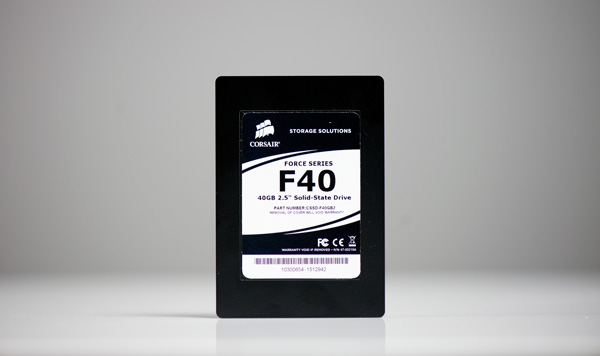Z68 SSD Caching with Corsair's F40 SandForce SSD
by Anand Lal Shimpi on May 13, 2011 3:06 AM ESTI have to admit that Intel's Z68 launch was somewhat anti-climactic for me. It was the chipset we all wanted when Sandy Bridge first arrived, but now four months after Sandy Bridge showed up there isn't all that much to be excited about - save for one feature of course: Smart Response Technology (aka SSD caching). The premise is borrowed from how SSDs are sometimes used in the enterprise space: put a small, fast SSD in front of a large array of storage and use it to cache both reads and writes. This is ultimately how the memory hierarchy works - hide the latency of larger, cheaper storage by caching frequently used data in much faster, but more expensive storage.
I believe there's a real future with SSD caching, however the technology needs to go mainstream. It needs to be available on all chipsets, something we won't see until next year with Ivy Bridge. Even then, there's another hurdle: the price of the SSD cache.
Alongsize Z68 Intel introduced the SSD 311, codename Larson Creek. The 20GB SSD uses 34nm SLC NAND, thus pricing the drive more like a 40GB MLC SSD at $110. Intel claims that by using SLC NAND it can deliver the write performance necessary to function as a good cache. Our benchmarks showed just that. The 20GB SSD 311 performed a lot like a 160GB Intel X25-M but with half of the NAND channels thanks to SLC NAND's faster write speed and some firmware tweaks. In fact, the only two complaints I had about the 311 were its limited capacity and price.
The capacity issue proved to be a problem as I found that after almost a dozen different application launches it wasn't too hard to evict useful data from the cache. The price is also a problem because for $100 more you can pick up a 120GB Vertex 2 and manage your data manually with much better performance overall.
Yesterday a friend pointed me at a now defunct deal at Newegg. For $85 Newegg would sell you a 40GB SF-1200 based Corsair Force SSD. That particular deal is done with and all that remains is the drive for $110, but it made me wonder - how well would a small SandForce drive do as an SSD cache? There's only one way to find out.

The Test
| CPU |
Intel Core i7 2600K running at 3.4GHz (Turbo & EIST Disabled) - for AT SB 2011, AS SSD & ATTO |
| Motherboard: |
Intel Z68 Motherboard |
| Chipset: |
Intel Z68 |
| Chipset Drivers: |
Intel 9.1.1.1015 + Intel RST 10.5 |
| Memory: | Qimonda DDR3-1333 4 x 1GB (7-7-7-20) |
| Video Card: | Intel HD Graphics 3000 |
| Video Drivers: | Intel GMA Driver for Windows 8.15.10.2372 |
| Desktop Resolution: | 1920 x 1200 |
| OS: | Windows 7 x64 |












81 Comments
View All Comments
jordanclock - Friday, May 13, 2011 - link
I like the idea of this article and it starts providing some extra data that was asked for in the original review: What about other SSDs? Could we get some more SSDs tested with SRT? I'm not expecting Vertex 3s, but some "older" SSDs like the F40 that would likely be replaced soon.MrSpadge - Friday, May 13, 2011 - link
Currently Anand tested 3 mid- to high performance SSDs and I think this gives us a pretty good picture overall. However, if another one was tested I'd want the 64 GB Agility 3 and/or Solid 3. Well, a proper review of them would be very nice anyway ;)MrS
Cow86 - Friday, May 13, 2011 - link
Yea I was thinking the same thing...they supposedly perform a lot better, while still being reasonably affordable for the 60GB drives (~110 euro's here). Maybe they'd be the ultimate cache at a reasonable price point? Either way would love a review of those as well, vertex 3 is staying rather expensive :(jebo - Friday, May 13, 2011 - link
I agree that the Agility 3 and Solid 3 look very promising.therealnickdanger - Friday, May 13, 2011 - link
Plus, SRT works with drives up to 64GB, so it seems worth it to test a drive of that size. I imagine there are many users (such as myself) that have older Intel 80GB, Indilix 64GB, or SandForce SF1200/1500 64GB drives that will soon be replaced with faster 6Gbps drives.I would imagine that you could a drive of any size, especially the larger ~120GB SSDs that offer significant speed advantages over the 64GB models. SRT would limit the usable cache to 64GB, but it would still be interesting to see...
*wink**hint*
Boissez - Friday, May 13, 2011 - link
Yup - Here's another vote for that article. I have an 'old' 60GB agility 2 boot drive and a Z68 board on it's way. Question now is whether I keep it as boot drive or whether I take a performance hit and use it as cache. This article comes close to answering it yet Anandtech's own SSD workload benchmarks (which are the most interesting IMO) does not include the F40's numbers.GullLars - Tuesday, May 24, 2011 - link
If you can fit your OS and core apps/games on your agility 2, it's a no-brainer, keep it as you have. If you have a lot of apps and games you have had on HDDs and use often, you could concider trying it as cache.I have 3 computers with 32GB boot drives (1 laptop, HTPC, and a donated SSD to my fathers computer), and all of them get by fine with that with a little bit of management. You could concider using 30GB for caching and 30GB for OS + core apps, getting full SSD speed on the stuff you use the most, and have cache help out on game loads and more seldom used apps.
Mr Perfect - Friday, May 13, 2011 - link
That's what I'm thinking too. Get yourself the largest, fastest cache you can and see what happens. :) Currently that's looking like a 64GB Agility 3 or Solid 3.samsp99 - Friday, May 13, 2011 - link
I was just asking myself this very question...genji256 - Friday, May 13, 2011 - link
I'm confused. If the 311 performed better on the second run ("Intel 311 - Run 1" in your table), shouldn't that mean that the cache was large enough to store the data for all the applications (since they all ran during the first run)? If so, why would there suddenly be data evicted from the cache between the second and third run ("Intel 311 - Run 1" and "Intel 311 - Run 2" respectively)?